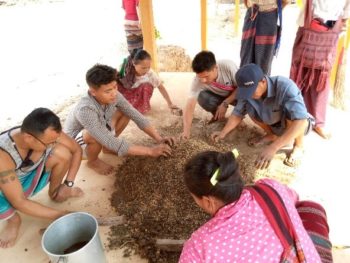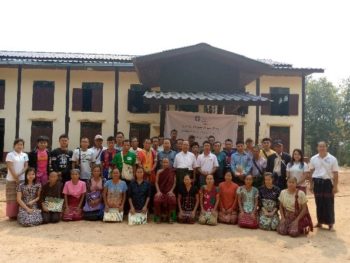From Livelihood Technical Forum to Street Renovation – The Myanmar Forum has been active on various issues:
- Forming Livelihood Technical Forum Meeting among ACT members’ organizations in Myanmar
ACT member organizations in Myanmar have been holding a “Livelihood Technical Forum Meeting” starting on May, 2020, since most of the project activities are temporarily postponed and almost all staffs are working from home due to Covid-19. A livelihood technical forum meeting was hold in order to foresee the impact on community livelihood and implementation by the pandemic, how the implementation should be continued and what kinds of activities should be prioritized. Partner organizations working with ACT members’ organizations also had a space to participate in the meeting.
The meeting was held on a monthly basis for one and half hours, and organized through zoom. Eight technical focal staffs from ACT member organizations and three staffs from partner organizations actively participated in the Livelihood Technical Forum Meeting. This pandemic makes us brainstorm what a future implementing strategy should be like.
The following picture was taken during the third Livelihood Technical Forum Meeting through zoom on 22nd June, 2020:
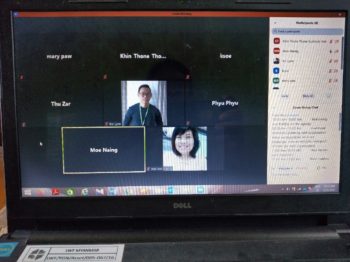
- Covid-19 Response in 18 villages in Kayin State, Myanmar
An ACT joint project has been implementing in Kayin State for the sake of their sustainable livelihood through the dissemination of CSA and market orientated approach. During Covid-19, the community living in project implementing villages have been affected.
Karen Baptist Convention (KBC), the implementing partner of the ACT joint project in Myanmar, collected and accessed the information in order to know their implementing villages’ needs. After that, vinyl and posters about hand washing steps and precautions measures regarding Covid-19 were distributed for the sake of health education to the villagers living in hard to reached area. In addition, infrared thermometers and hand washing items such as soaps, hand sanitizers and buckets were made available in 18 villages in Kayin State by collaboration with village development committee members and their association personnel.
The following pictures were taken meantime Covid-19 response in Mya That Kone Village, Thandaunggyi Township:
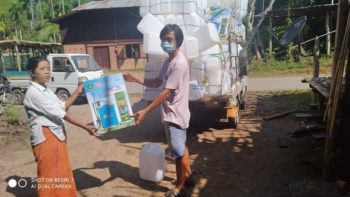
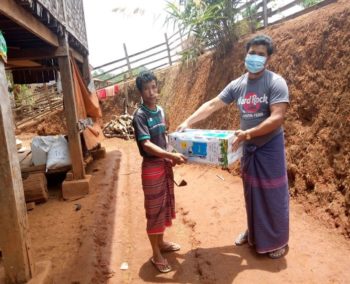
- Street Renovation Activity in Thandaunggyi Township, Kayin State
Under the ACT Joint project in Myanmar, street renovation activities have been done in February and March. They were implemented in five villages, namely Kya Mine, Myauk Phe’ Boe, Kyauk Phyar, Taw Pyar Kalay, and Ngwe Taung Gyi located in Thandunggyi Township, Karen State.
The activity aimed for better transportation to carry local products to access the market according to the communities’ needs plus the recommendations of the 2019 report. Additionally, the communities save time when there are emergency health cases.
Project staffs and village development committee (VDC) members organized this activity. The ACT Joint project provided 1,500,000 MMK to each village. The VDCs members lead in coordination with township administrative staffs. In addition, the communities added their village development fund which they have been saving benefits from Income Generation Activities (IGA) and Self Help Group (SHG) activities. The communities contributed their labor force to accomplish the activity as well.
Good cooperation among the villagers, and good management and leadership of VDCs can vividly be seen in this implementation.
The following pictures were taken meantime street renovation activities in Kyauk Phyar village:
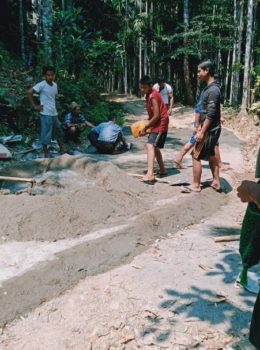
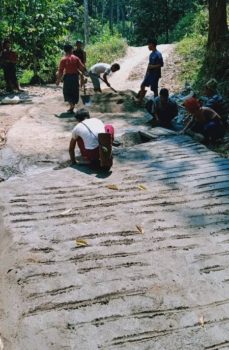
- Elephant Foot Yam Cultivation Training in Hlaing Bwe Township, Kayin State
In February, 2020, an Elephant Foot Yam cultivation training has been conducted at Ywar Kaing Kaung village in Hlaing Bwe Township. The training took two days and 37 farmers including 11 women farmers fully participated.
The training took aim at the farmers knowing and applying sustainable methods for improving their soil and increasing yield. As a result, the farmers can increase their income by reducing the inputs and resulting low cost in elephant foot yam production and then they are able to apply the environmental friendly techniques for crop production as well.
The training covered the following topics: climate change, benefit of elephant foot yam cultivation, process and method of elephant foot yam, preparation of field, transplanting, management of weed, water, pest and disease, soil and fertility. For the sake of understanding, practical sessions were also added. The ACT joint project staffs will continue to support and provide technical guidelines to partner communities in applying.
The following pictures were taken during the Elephant Foot Yam Cultivation training. The first photo is showing the participants making natural composts by using farm waste and the second photo is a group photo of the training participants:
